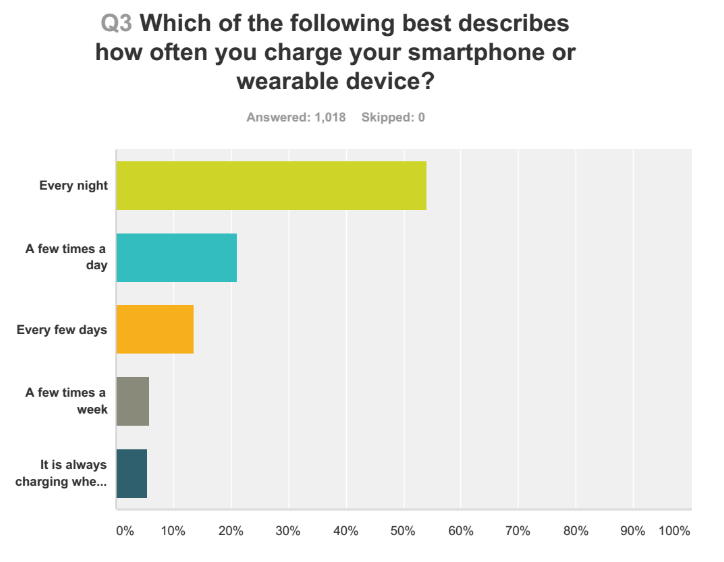Consumers want wireless charging throughout their connected lives – at home, at work and especially when traveling, according to a new survey conducted by the AirFuel Alliance and its member partners. The global consortium, which is focused on enabling and accelerating the adoption of wireless power technology, today released the 2017 Wireless Power Survey Report in partnership with WiTricity, Energous, Nordic Semiconductor, NuVolta, Powersphyr, and NewVastek.
The report provides insights into how consumers view wireless charging and what they want to experience in the near future. Chief among their desires is ubiquity – they want wireless charging to be second-nature (71 percent want wireless charging in their next device) and to be available when and where they need it. In addition to the home, 76 percent of consumers want wireless charging when traveling and 50 percent want it at work (with 43 percent saying if that were the case, they would find their job easier to do).

And the majority of consumers surveyed say they would spend money on wireless charging for their devices if it was available in more public places. In fact, more than 80 percent would pay up to $50 to add wireless charging capabilities to their device, with 12 percent willing to spend up to $100 to say goodbye to wires.
Consumers today are also frustrated with the current options available to them for charging, are sick of the stress associated with battery drain, and want durability and speed along with freedom. Some key findings from the report include:
Charging Solutions Aren't Cutting It – the pain of plugging in is not the only frustration today's consumers feel when it comes to ensuring their devices are powered up — 38 percent see different chargers for different devices as the biggest challenge they face with current solutions on the market.
Battery Anxiety Is Increasing – the concern of a battery dying, and ultimately the inability to use a device – is a real stressor for consumers today. Over 45 percent of respondents worry about losing a charge a few times a day and 49 percent do not even want to think about plugging in their smartphone or putting devices in a precise position to charge. They just want it to happen.
Consumers want more than freedom from wires – While 72 percent say wireless charging capabilities are important to them, 62 percent of those individuals said speed of charge is also critical. Over 58 percent also noted that while wire-free charging is desirable, they do not want to give up the durability of the device to make it happen.
A Wireless World is Around the Corner — Nearly all consumers (93%) think wireless charging will become the new norm over the next three years. They expect major metropolitan areas and technology hubs like New York, San Francisco, Silicon Valley and Chicago as the first to say goodbye to wires.
“While consumers’ wireless tastes and preferences continue to evolve, it is clear they agree on some key requirements for the future and one of them is wireless charging,” said Ron Resnick, AirFuel Alliance chairman. “The good news is the industry, AirFuel and its members are prepared to meet their demand. As consumer awareness peaks, we’ll see more and more manufacturers creating the solutions and solving the pain points outlined in our survey, leading us toward a truly ‘unplugged’ world,”
About AirFuel Alliance
AirFuel Alliance is an association dedicated to building a global wireless charging ecosystem based on best-in-industry inductive, resonant, RF and future wireless charging technology. AirFuel Alliance's mission is to bring a diverse base of interoperable products to the global market that delivers the best wireless charging experience for consumers.
The organization membership is made up of 170 leading technology and consumer electronics companies, including board of directors companies Dell, Duracell, Energous, Gill Electronics, MediaTek, ON Semiconductor, Powermat Technologies, Qualcomm Inc., Samsung Electronics, Semtech, Starbucks and WiTricity.
Advertisement





